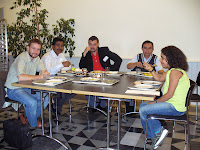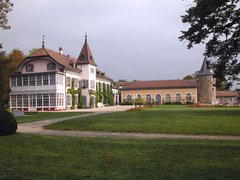 A big part of this program has to do with the fact that the 30 of us don’t just study ecumenism academically, we attempt to live it out in community. It’s no small feat when you consider that we represent eight different Christian traditions, speak at least a dozen different languages, and hail from practically every region of the world.
A big part of this program has to do with the fact that the 30 of us don’t just study ecumenism academically, we attempt to live it out in community. It’s no small feat when you consider that we represent eight different Christian traditions, speak at least a dozen different languages, and hail from practically every region of the world. The place we call home is called Petit-Bossey (pictured above), a cozy residence building that’s a pleasant five-minute walk from the château where we get our three squares a day, take our coffee breaks, and have most of our classes.
The place we call home is called Petit-Bossey (pictured above), a cozy residence building that’s a pleasant five-minute walk from the château where we get our three squares a day, take our coffee breaks, and have most of our classes. Each day officially begins with a brief chapel service, which we take turns leading in pairs. I’m up this Thursday, planning worship with a Brazilian Methodist. Because of the diversity of our backgrounds, no two services are ever alike, which can be both interesting but also a little jarring. If we’ve experienced any tensions in our fledgling ecumenical community thus far, it’s been because of things that have been said or done in the chapel (pictured right). Not terribly surprising, I suppose, when you’re asking everyone from an African Pentecostal to a Romanian Orthodox to worship together and get something out of it.
Each day officially begins with a brief chapel service, which we take turns leading in pairs. I’m up this Thursday, planning worship with a Brazilian Methodist. Because of the diversity of our backgrounds, no two services are ever alike, which can be both interesting but also a little jarring. If we’ve experienced any tensions in our fledgling ecumenical community thus far, it’s been because of things that have been said or done in the chapel (pictured right). Not terribly surprising, I suppose, when you’re asking everyone from an African Pentecostal to a Romanian Orthodox to worship together and get something out of it. Fortunately, we’re all able to agree on that most universal of religions: soccer. When weather and time permit, several of us leave our doctrinal divisions on the sidelines and hit the soccer pitch. In all seriousness, it’s remarkable how something like a team sport can be a great equalizer and rather minimize our differences.
Fortunately, we’re all able to agree on that most universal of religions: soccer. When weather and time permit, several of us leave our doctrinal divisions on the sidelines and hit the soccer pitch. In all seriousness, it’s remarkable how something like a team sport can be a great equalizer and rather minimize our differences.Perhaps we should abandon plans for another World Council of Churches assembly and opt instead for a big ecumenical soccer tournament. Rather than a trophy, the winning denomination could get the right to call itself the One, True Church until the next tournament.



